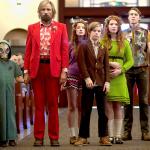Viggo Mortensen Captivates in ‘Captain Fantastic’

A story of love and extremes, the pleasurably freewheeling “Captain Fantastic” centers on a family that has found its bliss in splendid, unplugged isolation. Somewhere in deepest Oregon, amid the tall pines and soaring mountains, young and old hunt and holler and drop lines from Noam Chomsky. The clan’s father isn’t a superhero, but because he’s played by Viggo Mortensen he’s the next best thing. Mr. Mortensen, whose intensity has the sting of possession, has a way of making you believe his characters can do whatever they set their minds to: fly, leap over buildings, save the world.
Mostly, though, Ben Cash takes care of his children. For years, he and his ailing dream of a wife, Leslie (Trin Miller), have been living with their six kids, who range in age from 7 to 18, on a compound where they have thrived beautifully without electricity, a sewer line or trend alerts about the Kardashians. By day, Ben teaches and trains the children, racing them through the woods like Olympians or Special Forces soldiers. At night, the family plays music together and reads by firelight — leafing through books one page at a time — before bedding down in the communal tepee.
Perhaps it all sounds fairly ridiculous, like a story about a little survivalist house in the woods or the start of a joke about puritanical parenting (no gluten, no grease) that has Gwyneth Paltrow as its punch line. But lifestyle doesn’t begin describe the Cash family’s alternative reality, and despite all the self-aware joking this isn’t a goof. From the moment the movie opens on a deer hunt — in a scene that suggests “Apocalypse Now” by way of “Lord of the Flies” — the writer-director Matt Ross makes it clear he has something weightier in store than mindful napping and snacks.
It begins with a sweep of green, a flash of silver and a smear of red. Discreetly staged and shot, rightly serious and intimate, the hunt turns out to be a rite of passage for the family’s eldest son, the teenager Bo (George MacKay). It’s all very solemn, but also over quickly, and Mr. Ross has soon shifted focus to the stream of younger children straggling out of the woods. Faces and bodies smeared in mud, they are a mesmerizing, surreal spectacle — one of the smallest, a Dennis Hopper-esque runt, wears what looks like a skinned bobcat for a hat. Soon, everyone is laughing while washing off the dirt and blood, a cleansing that gives the movie something of a sustained metaphor.
At first, the outside world looms in “Captain Fantastic” through its stark absence, even though the compound is well-equipped and stocked with necessities from that world, including sharp knives, heavy books and bales of mismatched clothes. Ben and Leslie have opted to live in seclusion as a matter of principle, having embraced protest as an ideal. At its loftiest, their profound seclusion suggests that they’re spiritual and philosophical heirs to an isolationist like Henry Thoreau; at worst, it suggests fanaticism, cultishness, selfishness. Touchingly, the children sometimes seem closer to the castaways of the Swiss Family Robinson, whose self-reliance was involuntary.
American movies about families tend to come in two flavors: the upbeat (the mainstream default) and the catastrophic (the indie brand). “Captain Fantastic” tries hard to find a third way. The story kicks in when a death forces most of the family off the compound and on the road, where they have silly and sober encounters with strangers and relatives on the way to a collective epiphany. (Kathryn Hahn, Steve Zahn, Frank Langella and Ann Dowd fill out the familial ranks.) Along the way, Ben keeps on keeping on about the evils of capitalism while his children discover themselves and other people, including in a sweet, trailer-park stay where Bo learns how to kiss a girl.
If “Captain Fantastic” doesn’t cram all of human experience into that box we like to call the dysfunctional family — a category that suggests that all anyone needs to get through Thanksgiving is therapy talk and a group hug — it’s partly because its characters have politics, not simply feelings. The Cash children stumble, but they’re supremely capable and self-aware. What makes them unusual isn’t their knife skills; it’s that they talk seriously about ideas. The same holds true of Ben, whose worldview falters only because Mr. Ross seems anxious to soften the extremes he’d sharpened. There’s something moving about his search for balance, something a little pleading too.
Perhaps it’s no surprise that Mr. Ross ends up nudging “Captain Fantastic” into more generic terrain. He never sells out his characters, but after all the radical power-to-the people talk he finally comes down on the side of compromise and the soft landing. It’s left to Mr. Mortensen, who can make menace feel like vulnerability — and turn vulnerability into a confession — to keep the movie from slipping into sentimentality. He’s the most obvious reason to see it, although Mr. Ross’s insistence on taking your intelligence for granted is itself a great turn on. His characters don’t need smartphones to do their thinking for them; he assumes the same holds true of his audience.
"Captain Fantastic" is currently screening in theaters across America.
[Manohla Dargis is a chief film critic for The New York Times, along with A. O. Scott.]
